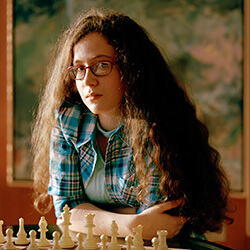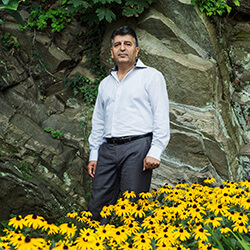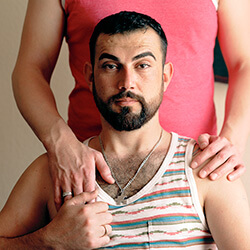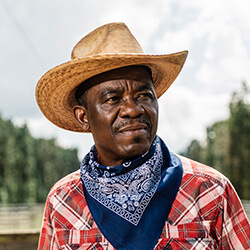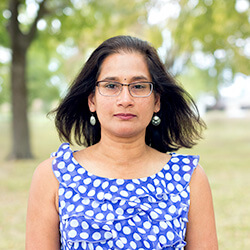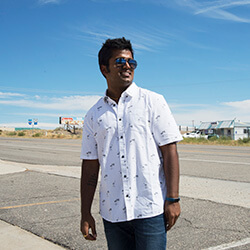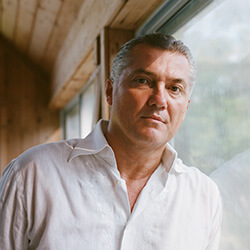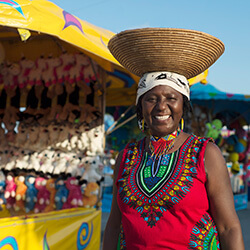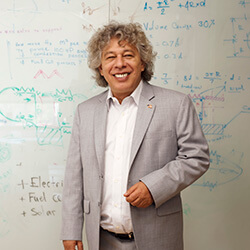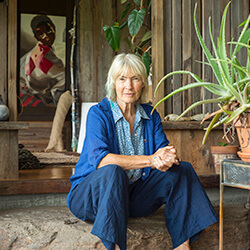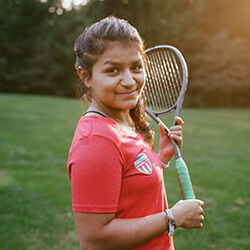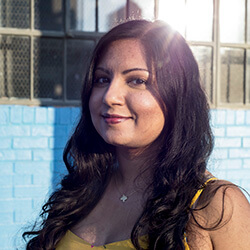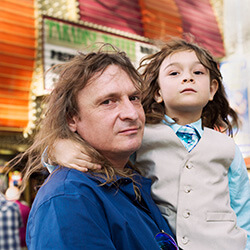Ukraine  Washington
Washington
Naomi Bashkansky
My mom tried to teach me chess when I was four, but I couldn't understand the pieces. But when I turned five, my brother sat me down and it just clicked. I'm 14 now, but according to my mom, when I was six I would beat 13-year-old boys. And they would be like, "Oh, wow! We lost to a six-year-old girl, man!" I wouldn't pay attention to that, because they were just weird boys talking.
I have an aggressive playing style. I'm good at attacking. I keep crushing the opponent and squeezing them. My Grandmaster coach sometimes thinks I'm too aggressive. "Young lady," he says, "hold your horses. You cannot attack just to attack. You need to prepare your attack." But playing aggressively works for me because I'm good at it.
My goal is to become a Woman Grandmaster by the end of high school. That's the highest title in the world. For four years, I've been working to move up, to become a Woman FIDE Master, which is only two away from Woman Grandmaster. This past year the World Schools Championship was in Sochi. If I came in first, I'd finally, finally earn my next title.
My parents travel with me to competitions to make sure I breathe and don't go to sleep at 1 a.m. When we found out the championship was in Russia, they were really excited. My mom and dad are both from Ukraine, so just seeing plane tickets and airline safety pamphlets all in Russian was a big deal to them. I can't read Russian, but I was excited to play in the snow. And also for the mashed potatoes. Chess tournaments always have really good mashed potatoes.
I wasn't nervous. To be honest, I thought I would get first place. I came into the competition ranked second, but suspected I was underrated. And the first round is always the easiest, because it's when the highest players play the lowest.
This time, though, something went wrong.
I had studied my opponent before the match, her typical openings and her playing style, but after a few turns, she did a move that strayed from what I had seen her do in previous games. I wasn't sure how to respond. I moved my queen. But then she moved her castle. This put me in a vulnerable position, so I was forced to move my queen back to where it was before. I tried again and again to increase my position, but I kept getting stuck, locking the two of us in back-and-forths that destroyed my game.
The playing halls are always very quiet. There are pieces hitting the board. Or someone clicking the clock, maybe someone coughing or sneezing. But other than that, it's completely quiet. I guess it's for concentration. But no matter how quiet it is, it's hard to play when you're losing.
I hate draws. I hate not fighting until the end. But in the case of this game, I knew I couldn't win and that she couldn't either. At international tournaments, to signal a draw you hold your hand above the board and cross your index and middle fingers. And that's what my opponent did.
I was disappointed, but I knew it was just the first round. You earn a point for every round you win, and a half point for draws. I could still come in first. I'd just have to make up for the lost half point in the next rounds. I sat down at the board for the second game. But again, I felt myself losing. Finally, the player crossed her fingers again. Another draw. I knew the third round couldn't possibly end in a draw. The player was much weaker than me. But … crossed fingers again. I was now 1.5 points behind. Too far behind to get first place. I wouldn't get my title.
At dinner, I was quiet. My mom is typically the one who asks about my games, because my dad doesn't know anything about chess. "What went wrong? Was it in the opening? Did you blunder?" But that night they could tell how disappointed I was, so they didn't say much. They let me spend some time thinking by myself.
The waiter brought us soup, a type my mom makes sometimes at home because my dad really likes it. Even though it hadn't been too long since my mom had prepared it, there was something about eating it there, in Russia, that made my parents really happy. Watching them eat, I felt sad. We had traveled a really long way to get to Sochi, and I knew it was an expensive trip, and I knew it was important to my parents that we were there. I had just really wanted to win.
I was nervous before the fourth round. Really nervous. But right before I went to play, I got an email from my brother. He's at college and we don't talk much. When we do, it's sort of sarcastic. But he looked at my scores from the first three rounds in Sochi. "Keep playing," he wrote.
In the fourth round, I moved first. I did my favorite opening, the one where I get a strong center and then I attack the opponent's king. I pushed my pawns forward; I got my pieces. It was like I felt my brain turning on. I played how I normally play.
I returned to my parents and told them I won.
I won the next round, and then the next and the next. Point after point after point. Before my final game, I looked at the standings. I was tied for first place. But if that final round ended in crossed fingers, I wouldn't win. I studied my opponent's openings and style, and as we played, she followed it closely, until one move. She messed up. I won.
When we got up from the board, I realized she was probably pretty sad. She had played well, and I wanted to try to make things feel not as bad for her. I have this bag that I always bring with me to the games, with cookies and other small snacks, and there was this one very large chocolate chip cookie. I looked for her in the hall and when I finally spotted her, I ran over and tapped her on the shoulder and held out the cookie, gesturing "Do you want one?" But she didn't want the cookie at all.
In the months since then, I've earned my next title: Woman International Master. I'm now only one title from Woman Grandmaster. I'm 14, and I've traveled to Rio, British Columbia, and New Jersey. The thing is, chess is a hard lifestyle. I don't know if I'll continue with it, if I'll do it professionally. I know in other countries, chess is sort of an escape. It offers opportunities people wouldn't find otherwise. But in the U.S. there's a whole bunch of things I could do. I could become a software engineer. I could go to medical school and become a doctor. Or maybe I'll start a business, I don't know. I still have plenty of years to decide. Any of those jobs, they'd certainly not be as stressful as chess. And regular life isn't like chess. In a chess game, when you lose, you lose. But in life if you lose, you keep on going.




